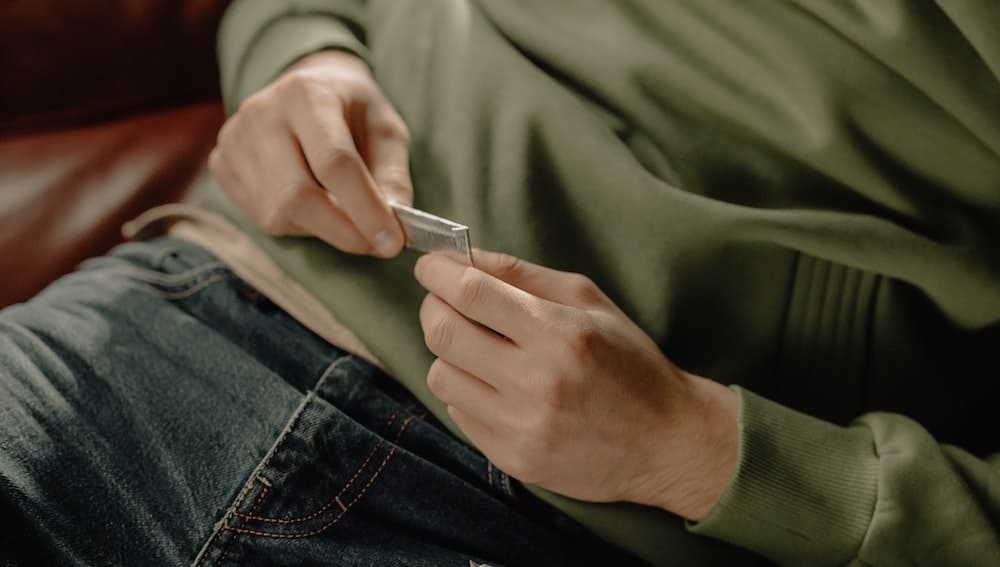Swallowing gum is a common occurrence that happens to many people, including pregnant women. However, there is a lot of misinformation and confusion surrounding the potential risks and effects of swallowing gum while pregnant.
In this article, we will explore what happens if you swallow gum while pregnant and provide accurate information to help ease any concerns.
Understanding Gum and Its Composition To fully understand the effects of swallowing gum while pregnant, it is important to first understand what gum is made of.
Gum is typically made of a combination of synthetic and natural ingredients, such as rubber, resin, and wax. These ingredients are not easily digested by the body, which is why gum is often not recommended to swallow.
Swallowing Gum: The Process When you swallow gum, it follows the same process as any other food or drink. It enters the stomach and is broken down by stomach acid and digestive enzymes.
However, unlike other foods, gum is not easily broken down and may take longer to pass through the digestive system. This has led to concerns about potential blockages or harm to the fetus if swallowed while pregnant.
Key Takeaways
- Swallowing gum while pregnant is not harmful to the fetus.
- Gum is not easily digested by the body and may take longer to pass through the digestive system.
- It is recommended to avoid swallowing gum while pregnant to prevent potential digestive issues.
Understanding Gum and Its Composition
Chewing gum is a popular confectionery product that is consumed by millions of people worldwide. It is a type of candy that is designed to be chewed, rather than swallowed.
The gum base is the primary component of chewing gum, and it is made up of a combination of resins, emulsifiers, fillers, waxes, and softeners.
Resins are natural or synthetic materials that are added to the gum base to provide elasticity and texture. They are typically derived from trees, such as pine or spruce, or from petroleum-based sources.
Emulsifiers are used to keep the gum base from separating, while fillers are added to increase the bulk of the gum. Waxes are added to the gum base to improve its texture and to prevent it from sticking to teeth.
Softeners are added to the gum base to make it easier to chew. They are typically made from glycerin or vegetable oil. Flavors and colors are also added to the gum to enhance its taste and appearance.
Artificial sweeteners, such as aspartame, sucralose, sorbitol, and stevia, are used to sweeten the gum without adding calories.
Corn syrup is sometimes used as a sweetener in gum, but it is less common than artificial sweeteners. It is a type of sugar that is derived from corn and is often used as a substitute for cane sugar.
While chewing gum is generally considered safe, swallowing large amounts of gum can lead to digestive problems. Pregnant women should be cautious when consuming gum and should avoid swallowing it whenever possible.
Swallowing Gum: The Process
When a person swallows gum, it goes down the esophagus and into the stomach, just like any other food or drink.
The digestive system will attempt to break down the gum, but because gum is not digestible, it will remain in the stomach for a longer period of time than other foods.
The stomach acid and digestive enzymes will work to break down the other components of the gum, such as the sweeteners and flavors. However, the gum base itself will not be broken down and will eventually pass through the digestive system intact.
The gum will eventually exit the body in a bowel movement. It is important to note that swallowing gum on occasion is not harmful and will not cause any long-term damage to the digestive system.
During pregnancy, it is important to maintain a healthy digestive system for the health of both the mother and the developing baby.
Swallowing gum should not cause any harm to the baby, but it is recommended to avoid swallowing gum if possible to prevent any potential discomfort or digestive issues.
Pregnancy and Digestive Changes
Pregnancy is a time of great change for a woman’s body, including her digestive system. Hormonal changes during pregnancy can cause a range of digestive symptoms, from nausea and morning sickness to heartburn, constipation, bloating, and gas.
Nausea and vomiting, also known as emesis gravidarum, are common during the first trimester of pregnancy. This can be caused by the sudden surge in hormones, particularly human chorionic gonadotropin (hCG), which can irritate the stomach lining. Morning sickness can be mild or severe and can last throughout the day.
Heartburn is another common symptom of pregnancy, particularly in the second and third trimesters. This is caused by the relaxation of the lower esophageal sphincter, which allows stomach acid to flow back up into the esophagus. This can cause a burning sensation in the chest and throat.
Constipation is also common during pregnancy, due to the slowing down of the digestive system and the increased absorption of water from the colon. This can lead to bloating, gas, and discomfort.
Inflation of the gut can also occur during pregnancy, due to the pressure of the growing uterus on the intestines. This can cause abdominal pain and discomfort, particularly in the later stages of pregnancy.
It is important for pregnant women to maintain a healthy diet and lifestyle to minimize these digestive symptoms.
Eating small, frequent meals throughout the day, staying hydrated, and avoiding spicy or fatty foods can help reduce symptoms of nausea, heartburn, and constipation. Gentle exercise, such as walking or yoga, can also help improve digestion and reduce bloating and gas.
If digestive symptoms persist or become severe, it is important to speak with a healthcare provider to rule out any underlying conditions or complications.
Effects of Swallowing Gum While Pregnant
Swallowing gum while pregnant is generally considered safe and does not pose any significant risks to the mother or the baby.
However, it is important to note that gum should not be swallowed intentionally as it can lead to certain digestive issues.
When gum is swallowed, it passes through the digestive system without being broken down or absorbed. This is because gum is made of a combination of synthetic and natural rubber, which the digestive enzymes in the stomach cannot break down.
However, the gum will eventually be eliminated from the body through bowel movements, usually within a few days.
In rare cases, swallowing large amounts of gum or swallowing gum along with other indigestible objects can lead to an intestinal blockage.
This can cause symptoms such as bloating, gas, and abdominal pain. If you experience these symptoms, it is important to seek medical attention immediately.
Overall, while swallowing gum while pregnant is generally safe, it is important to avoid doing so intentionally and to seek medical attention if you experience any digestive issues after accidentally swallowing gum.
Potential Benefits of Chewing Gum During Pregnancy
Chewing gum during pregnancy can have some potential benefits that pregnant women may find helpful.
Here are some of the benefits of chewing gum while pregnant:
Alleviates Nausea and Morning Sickness
Nausea and morning sickness are common symptoms during pregnancy. Chewing gum can help alleviate nausea by increasing saliva production, which can help neutralize stomach acid. Some women find that ginger-flavored gum can be especially helpful in reducing nausea.
Increases Saliva Production
Pregnancy can cause a decrease in saliva production, which can lead to dry mouth and dental problems. Chewing gum can help increase saliva production, which can help prevent dental problems.
Burns Calories
Chewing gum can help burn calories and prevent excessive weight gain during pregnancy. However, it should not be used as a substitute for a healthy diet and regular exercise.
Helps Sleep Better
Chewing gum before bedtime can help relax the jaw muscles and promote better sleep. It can also help prevent snoring, which can be common during pregnancy.
Antacid Gums
Antacid gums are available that can help relieve heartburn and indigestion during pregnancy. These gums contain ingredients that can neutralize stomach acid and provide relief.
Overall, chewing gum during pregnancy can have some potential benefits. However, pregnant women should always consult with their healthcare provider before using any new products or remedies.
Potential Risks of Chewing Gum During Pregnancy
Chewing gum is a common habit among people of all ages. However, when it comes to pregnant women, there are some potential risks associated with chewing gum, especially if it contains certain ingredients.
One of the main concerns is the presence of artificial sweeteners in chewing gum. Some of the most commonly used artificial sweeteners include aspartame, sucralose, sorbitol, and stevia.
While these sweeteners are generally considered safe for consumption in moderate amounts, their effects on pregnant women and their developing fetuses are not well understood.
Research has shown that some artificial sweeteners, such as aspartame, may cross the placenta and accumulate in fetal tissues. This could potentially lead to adverse effects, including developmental problems and behavioral changes.
In addition to artificial sweeteners, some chewing gums may contain corn syrup or other chemical sweetening agents. These ingredients can increase the risk of gestational diabetes in pregnant women, a condition that can cause complications during pregnancy and delivery.
Furthermore, pregnant women with diabetes mellitus or phenylketonuria should avoid chewing gum that contains artificial sweeteners, as they can worsen their condition and lead to serious health problems.
Finally, some studies have suggested that chewing gum may increase the risk of cardiological problems in pregnant women. This is because chewing gum can increase the production of stomach acid, which can lead to heartburn and other digestive issues.
Overall, pregnant women should be cautious when it comes to chewing gum, especially if it contains artificial sweeteners or other potentially harmful ingredients. It is always best to consult with a healthcare provider before consuming any new products during pregnancy.
Special Cases: Nicotine and Sugar-Free Gums
There are some special considerations to keep in mind when it comes to nicotine and sugar-free gums.
Nicotine Gum
Nicotine gum is a type of chewing gum that is used as a nicotine replacement therapy to help people quit smoking. It contains nicotine, which is absorbed through the lining of the mouth.
While nicotine gum is generally considered safe during pregnancy, it is important to use it only under the guidance of a healthcare provider.
Nicotine can have harmful effects on a developing fetus, and quitting smoking without the help of nicotine gum is usually the best option.
Sugar-Free Gum
Sugar-free gum is a popular choice for people who want to freshen their breath or chew gum without consuming sugar. However, many sugar-free gums contain artificial sweeteners that can have potential side effects.
Aspartame
Aspartame is a commonly used artificial sweetener in sugar-free gum. While it is generally considered safe in moderate amounts, some studies have suggested that high levels of aspartame consumption may be linked to adverse effects on fetal growth and development.
Sucralose
Sucralose is another artificial sweetener that is often used in sugar-free gum. While it is generally considered safe during pregnancy, it is important to use it in moderation.
Sorbitol
Sorbitol is a sugar alcohol that is commonly used as a sweetener in sugar-free gum. While it is generally considered safe during pregnancy, consuming large amounts of sorbitol can have a laxative effect and cause diarrhea.
Stevia
Stevia is a natural sweetener that is often used in sugar-free gum. It is generally considered safe during pregnancy, but it is important to use it in moderation.
Corn Syrup
Corn syrup is a sweetener that is sometimes used in sugar-free gum. While it is generally considered safe during pregnancy, it is important to use it in moderation.
Overall, it is important to read the labels of sugar-free gum and avoid consuming large amounts of artificial sweeteners. Pregnant women should also talk to their healthcare provider before using nicotine gum or any other nicotine replacement therapy.
Consulting a Health Practitioner
If someone accidentally swallows gum while pregnant, it is recommended to consult a health practitioner. A health practitioner will be able to provide professional advice on the potential risks and the best course of action.
The health practitioner may recommend monitoring the pregnant woman and the unborn child for any signs of discomfort or complications. They may also suggest specific dietary changes or supplements to ensure the unborn child receives proper nutrition.
It is important to note that swallowing gum while pregnant is generally not harmful to the unborn child. However, if the gum contains high levels of sugar or artificial sweeteners, it may affect the baby’s blood sugar levels and contribute to gestational diabetes.
The health practitioner may also advise on the safe range of gum consumption during pregnancy, as excessive gum chewing can lead to jaw pain and tooth decay.
In summary, consulting a health practitioner is recommended if someone accidentally swallows gum while pregnant.
They can provide professional advice on potential risks and the best course of action, as well as recommend specific dietary changes or supplements to ensure the unborn child receives proper nutrition.
More on pregnancy:
Frequently Asked Questions
Is it safe to chew gum during pregnancy?
Yes, it is generally safe to chew gum during pregnancy. However, it is important to choose sugar-free gum to avoid excess sugar intake.
What should I do if I accidentally swallow gum while pregnant?
If you accidentally swallow gum while pregnant, don’t worry. The gum will pass through your digestive system and will be excreted in your stool within a few days.
What are the potential risks of swallowing gum while pregnant?
Swallowing gum while pregnant can cause constipation or intestinal blockage in rare cases. However, this is unlikely to happen if you swallow gum only occasionally.
Can swallowing gum harm my developing baby?
Swallowing gum while pregnant is unlikely to harm your developing baby. The gum will not cross the placenta and will not affect your baby’s development.
Are there any types of gum that are safe to chew while pregnant?
Sugar-free gum is the best choice while pregnant, as it helps prevent tooth decay and does not contain excess sugar.
What should I do if my child swallows gum while I’m pregnant?
If your child swallows gum while you’re pregnant, don’t panic. The gum will pass through their digestive system and will be excreted in their stool within a few days. If you have any concerns, talk to your healthcare provider.

Nazeli Gevorgyan studied at Yerevan State Medical University and is an Obstetrics/Gynecology resident




